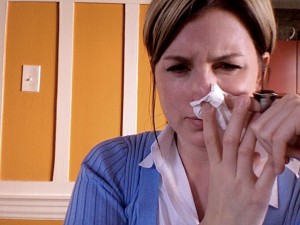
Post by Simon Goring, Postdoc at the University of Wisconsin-Madison.
This post originally appeared on downwithtime.
“When you have hayfever you are suffering for the greater good of science.”
-Me. The Larry Meiller Show, WPR. July 16, 2014 [Program Archive]

Figure 1. Your pain is science’s gain. Pollen may go into your nose, but it also enters aquatic environments where it is preserved in lake sediments. Photo Credit: flickr/missrogue
Of course, I was talking paleoecology and the way we use airborne pollen trapped in lake sediments to help improve models of future climate change. We improve models by reconstructing forests of the past. This is one of the central concepts in PalEON (not suffering, paleoecology): Improve ecosystem model predictions for the future by testing them on independent reconstructions of the past. Give greater weight to models that perform well, and improve models that perform poorly.
I was lucky to be on the Larry Meiller Show along with Paul Hanson to discuss PalEON and GLEON, two large scale ecological projects with strong links to The University of Wisconsin. We talked a bit about climate change, large scale research, science funding, open science and historical Wisconsin. It was lots of fun and you can check out the archive here.
I feel like I was a little more prepared for this interview than I have been in the past. Jack Williams passed along his (autographed) copy of Escape from the Ivory Tower by Nancy Baron. The book helped me map out my “message box” and gave me a much better sense of what people might want to hear, as opposed to the things I wanted to talk about (how much can I talk about uncertainty, age modelling and temporal connectivity?). It was useful, and I hope I came off as well prepared and excited by my research (because I am). Regardless, just like learning R, public outreach is a skill, and one that I am happy to practice, if only because I intend to keep doing it.
Anyway, enough science outreach for one week. With this blog post and WPR I’m well above quota!
